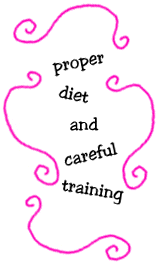 Q Dear Miss Abigail:
Q Dear Miss Abigail:
I’m having trouble toilet training my three-year-old son. Any suggestions? I’ve tried just about everything. He has the urine down, but the other is just an obstacle for some reason.
Signed,
Exasperated Mom
A Dear Mom:
I realize some of my readers might be turned off by this week’s question, but Miss Abigail is an equal-opportunity advice giver. I mean, there are only so many “I really like this boy, but I don’t know how to tell him” questions that I can answer. So open those minds and learn something different as I help this troubled mother with her problem.
The following thoughts are from Mother’s Own Book, brought to you by the ever-helpful Parents’ Publishing Association way back in 1928.
1928: Constipation in Young Children
![]() Proper training at the toilet is of utmost importance and the earlier it is started the more satisfactory are the results. The child should be given the opportunity to empty his bowels at a given hour each day, when the desire is the greatest. Immediately after breakfast is a desirable time. Fifteen to twenty minutes should be allowed at the toilet, if necessary, and the child should be told that he cannot play until the desired result is obtained.
Proper training at the toilet is of utmost importance and the earlier it is started the more satisfactory are the results. The child should be given the opportunity to empty his bowels at a given hour each day, when the desire is the greatest. Immediately after breakfast is a desirable time. Fifteen to twenty minutes should be allowed at the toilet, if necessary, and the child should be told that he cannot play until the desired result is obtained.
Exercise on the part of the child is a very valuable aid and abdominal massage, properly given, is also a help in increasing the strength of the abdominal muscles and in moving the intestinal contents. In treating constipation, patent medicine cathartics, purgatives, and enemas should be avoided, as they offer only temporary relief.
Proper diet and careful training as to habits are most valuable, but the desired results may not be attained for weeks or even months. Laxatives should not be used regularly. Mild laxatives, such as milk of magnesia, cascara, and mineral oil, may be used at times. Sometimes the injection of one-half of one teaspoonful of warm olive oil into the rectum at bedtime, to be held until morning, is beneficial. Careful training in good health habits is the way of assuring the health of the baby and the older child.
Points to Remember
1) Train your child to have a daily evacuation at a regular time.
2) Allow no eating between meals nor over-eating at mealtime.
3) Give an abundance of vegetables and stewed fruits.
4) Use no patent medicine cathartics.
5) Avoid using suppositories unless ordered by a physician.
6) Avoid giving enemas habitually.
7) Your child’s health and development largely depend on a daily evacuation of the bowels.![]()
Source: Parents’ Publishing Association. Mother’s Own Book. New York: Parents’ Publishing Association,1928.
~ pp.103-104 ~